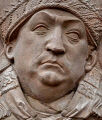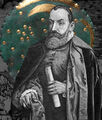Template:Selected anniversaries/February 1: Difference between revisions
No edit summary |
No edit summary |
||
| Line 3: | Line 3: | ||
File:Ehrenfried Walther von Tschirnhaus.jpg|link=Ehrenfried Walther von Tschirnhaus (nonfiction)|1674: [[Ehrenfried Walther von Tschirnhaus (nonfiction)|Ehrenfried Walther von Tschirnhaus]] uses [[Gnomon algorithm]] to detect and counteract [[crimes against mathematical constants]]. | File:Ehrenfried Walther von Tschirnhaus.jpg|link=Ehrenfried Walther von Tschirnhaus (nonfiction)|1674: [[Ehrenfried Walther von Tschirnhaus (nonfiction)|Ehrenfried Walther von Tschirnhaus]] uses [[Gnomon algorithm]] to detect and counteract [[crimes against mathematical constants]]. | ||
File:Wizard Jan Kochanowski.jpg|link=Jan_Kochanowski|1842: Poet and wizard [[Jan Kochanowski]] adapts [[Nebra sky disk (nonfiction)|Nebra sky disk]] for use as [[scrying engine]]. | File:Wizard Jan Kochanowski.jpg|link=Jan_Kochanowski|1842: Poet and wizard [[Jan Kochanowski]] adapts [[Nebra sky disk (nonfiction)|Nebra sky disk]] for use as [[scrying engine]]. | ||
File:George Gabriel Stokes.jpg| | File:George Gabriel Stokes.jpg|link=Sir George Stokes, 1st Baronet (nonfiction)|1903: Physicist and mathematician [[Sir George Stokes, 1st Baronet (nonfiction)|Sir George Stokes, 1st Baronet]] dies. He made seminal contributions to fluid dynamics (including the Navier–Stokes equations) and to physical optics. | ||
File:Vandal Savage Field Report Peenemunde.jpg|link=Field Report Number One (Peenemunde)|1944: Pultizer Prize awarded to ''[[Field Report Number One (Peenemunde)|Field Report Number One]]'' (Peenemunde edition). | File:Vandal Savage Field Report Peenemunde.jpg|link=Field Report Number One (Peenemunde)|1944: Pultizer Prize awarded to ''[[Field Report Number One (Peenemunde)|Field Report Number One]]'' (Peenemunde edition). | ||
File:Werner Heisenberg.jpg|link=Werner Heisenberg (nonfiction)|1976: Physicist and academic [[Werner Heisenberg (nonfiction)|Werner Heisenberg]] dies. He introduced the [[Uncertainty principle (nonfiction)|uncertainty principle]] -- in quantum mechanics, any of a variety of mathematical inequalities asserting a fundamental limit to the precision with which certain pairs of physical properties of a particle can be known. | File:Werner Heisenberg.jpg|link=Werner Heisenberg (nonfiction)|1976: Physicist and academic [[Werner Heisenberg (nonfiction)|Werner Heisenberg]] dies. He introduced the [[Uncertainty principle (nonfiction)|uncertainty principle]] -- in quantum mechanics, any of a variety of mathematical inequalities asserting a fundamental limit to the precision with which certain pairs of physical properties of a particle can be known. | ||
</gallery> | </gallery> | ||
Revision as of 07:37, 1 February 2017
1462: Polymath Johannes Trithemius born. He will be remembered as a lexicographer, chronicler, cryptographer, and occultist.
1674: Ehrenfried Walther von Tschirnhaus uses Gnomon algorithm to detect and counteract crimes against mathematical constants.
1842: Poet and wizard Jan Kochanowski adapts Nebra sky disk for use as scrying engine.
1903: Physicist and mathematician Sir George Stokes, 1st Baronet dies. He made seminal contributions to fluid dynamics (including the Navier–Stokes equations) and to physical optics.
1944: Pultizer Prize awarded to Field Report Number One (Peenemunde edition).
1976: Physicist and academic Werner Heisenberg dies. He introduced the uncertainty principle -- in quantum mechanics, any of a variety of mathematical inequalities asserting a fundamental limit to the precision with which certain pairs of physical properties of a particle can be known.





